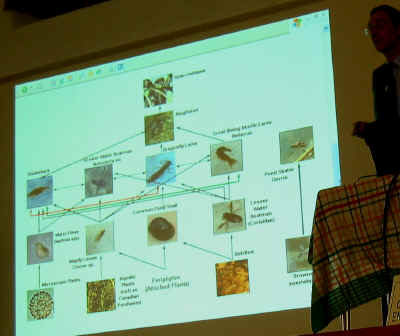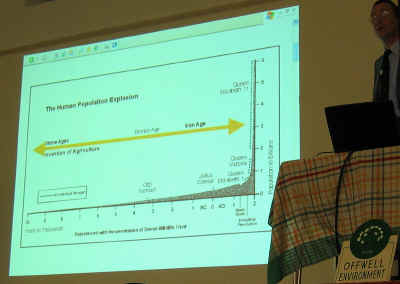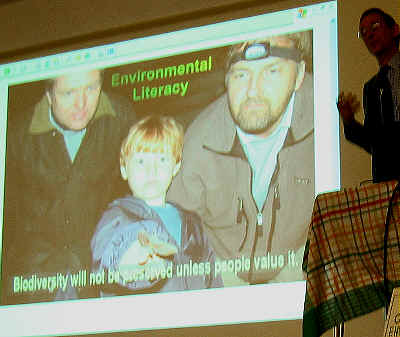|
People and Biodiversity
Is there a Future?
A Public Lecture given by Stephen
Lawson
Director of the Offwell Woodland & Wildlife Trust

The Eighth Annual Offwell Lecture, organised by Offwell
Environment Link
Supported by Epson
| The public lecture entitled 'People
and Biodiversity - is there a future?' was held on the 30th October 2004, in the
Mackarness Hall in Honiton, Devon, SW England. The lecture was the eighth Annual Offwell Lecture, organised by
Offwell Environment Link (OEL). The objective of the Annual Offwell Lectures is to raise
public awareness of global environmental issues which concern people in Britain and to
spark debate. Invited speakers are people who are experts in their field, who are able to
bring up to date knowledge and insights to the audience.
The lecture was given by Stephen
Lawson, the Director of the Offwell Woodland & Wildlife Trust. The Trust is a
conservation and education charity based in Offwell, just outside of Honiton. In addition
to its local activities, the Trust also has world-wide influence through its award-winning
website. The website is linked to and extensively used by people, organisations and
institutions from well over 100 countries around the globe.
Stephen has a background in
agriculture and has been involved with the practical conservation and management of
British habitats for over 30 years.
| The
lecture was exceptionally wide-ranging. It drew on observations from established figures
such as Malthus and Sir David Attenborough as well as research from one of Britain's
longest running agricultural experiments. Topics included geology, prehistoric life on
earth, present biodiversity, factors affecting biodiversity, extinction rates, the earth's
life and living processes, human population dynamics, intensive agriculture and
organic farming, UK land usage, environmental footprint and sustainability, export of
environmental demand from the developed world, human survival needs and finally,
guaranteeing biodiversity in the future. |
| Initially,
biodiversity (i.e. the great variety of life on earth) both world-wide and in
Britain, was explored. The point was made that biodiversity varies naturally
world-wide, as well as over geological and 'normal' time. The
talk progressed to discuss the current alarming species extinction rates being documented
in Britain and around the globe. This possible sixth major extinction event in the world's
history is being driven to a great degree by habitat loss. |
 |
|
. |
Evidence for the often
quoted 'Interdependence of all life on earth'
was explored. Certain processes, such as photosynthesis, pollination and nutrient
recycling, are undisputedly essential for life on earth as we know it to continue.
However, the actual species performing these processes change naturally over geological
time anyway. This indicates that in many cases, it is the roles species play which are
important, rather than their individual characteristics.
Provided these vital life processes are maintained, then the
fate of any number of individual species not directly involved in these processes
appears to have little bearing on human survival. |
 |
|
. |
| Some truly alarming statistics were
presented to illustrate the meteoric climb in human population levels world-wide and in
Britain over the past 200 years. Many other living species are
basically losing out in the competition for space.
Ever-increasing areas of land are needed to grow food and provide
housing and infrastructure for burgeoning human populations. These land uses automatically
result in reductions in biodiversity. |
 |
|
. |
Vital measures suggested to reverse or
halt biodiversity losses were:
- A reduction in Human populations, combined with living in ways that
reduce our use of the earth's natural resources.
- Farming UK agricultural land intensively, while providing wildlife
habitats through proven measures such as beetle banks and conservation headlands.
- EDUCATION - If there is apparently no imperative need to maintain
high biodiversity in order to ensure human survival, then the only way to preserve
biodiversity is to encourage people to value nature and wildlife in its own right.
|
 |
A
discussion period concluded the lecture. |
Offwell Environment Link is a registered charity with a charitable aim of furthering public
education in British countryside and wildlife. OEL is also the local community support
group for the Woodland Education Centre
in Offwell. The Centre is run by the Offwell Woodland & Wildlife Trust, also a
registered charity.
OEL are indebted to Epson for the loan of the IT projector used in the
lecture.
|
Read other related articles
Copyright © Offwell Woodland & Wildlife Trust
1998/9 & 2000/1/2/3/4 http://www.offwell.info
All
the information including images, charts, movies and sounds is provided copyright
free, only for educational use by schools, colleges and universities unless you are making
a charge. If you wish to use information or any part of this site for commercial purposes
or for any purpose where a charge is made then you must get permission, so make sure you contact us first. Remember, if you are not
a school, college or university you must obtain permission to use any part of this
website. Note that company logos are reproduced with permission and remain copyright of
their respective owners.
|




